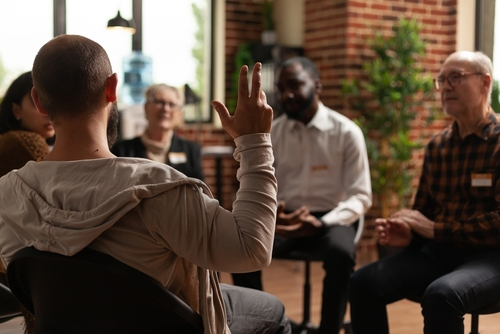Addiction intertwines emotional, physical, and psychological elements, creating a complex tapestry unique to each individual. The path to recovery isn’t a straight line; it’s filled with hurdles and victories. One odd aspect of this journey is experiencing a relapse during times that seem positive or stable. It’s important to understand why these setbacks can occur even when everything else seems to be going well. When you are aware of any possible traps, resisting when the temptation arises unexpectedly will be easier. So, let’s talk about this: Why do addicts relapse when things are good?

Addiction Vs. Substance Use Disorder
Understanding the difference between addiction and a substance use disorder (SUD) is the first step to both receiving and providing appropriate support and treatment. While these terms are often used interchangeably, they each have distinct meanings.
Addiction
Addiction is generally seen as a chronic condition where there’s an intense and uncontrollable desire for drugs or alcohol – even when they cause harm. This condition results in lasting changes in the brain, and it leads to behaviors that are commonly associated with substance abuse.
Note: The terms “addict” and “alcoholic” are stigmatizing, and we recommended using person-first language to avoid labeling individuals based on their condition. Person-first language emphasizes the person, not the condition. For example, instead of: “addicts,” you can use “individuals with substance use disorder” or “people in recovery.”
Check out one of our related blog articles: Can Alcoholics Ever Drink Again?
Substance Use Disorder
Substance use disorder or SUD a broader term, covering a range of issues from mild to severe, all stemming from substance use that disrupts daily life. Why is it important to recognize this difference? It shapes our approach to treatment. Addiction points to a deeper dependency, while SUD allows for an understanding that every person’s experience with substance use is different – and so are their paths to recovery. If you or a family member is struggling with addiction, talk to a professional and find out if a substance use disorder has developed.
Read more about substance use disorders and how they can stem from repressed trauma.

The “Pink Cloud” Phenomenon In Early Sobriety
In the initial stages of sobriety, many individuals encounter the “pink cloud.” This period is characterized by euphoria and an optimistic outlook on recovery. It’s a time when the immediate struggles with addiction seem to fade and get replaced by a feeling of joy and a strong belief in the ease of remaining sober.
Yet, this “pink cloud” phase can be somewhat deceptive. It often brings a false sense of security and leads to the belief that the toughest part of the journey is behind them. Such overconfidence can diminish awareness of the continuous effort that is required to stay sober. This can result in complacency. The real risk here is not being fully prepared for future challenges. This unpreparedness can heighten the likelihood of relapse when one is faced with the complex and not always positive realities of life.
Why Good Times Can Be Challenging in Recovery
Managing life’s wins can sometimes be unexpectedly difficult for those in recovery. Individuals might not know how to reward themselves, which can paradoxically set the stage for a relapse when everything is going well.
Here’s why people relapse when things are good:
- Feeling too confident: When things are going well, there’s a risk of feeling too self-assured. This overconfidence might lead to risky decisions, like being in situations where substance use is present, under the mistaken belief that one can handle it.
- Handling intense positive emotions: Experiencing strong positive emotions can be just as overwhelming as negative ones, especially after hardship. This intensity can sometimes reignite old habits. That includes reaching for substances as a way to cope.
- Disrupting established routines: Positive changes often bring shifts in daily routines. Such disruptions can unsettle the structured lifestyle that’s so essential for maintaining sobriety. This can lead to the neglect of vital self-care and healthy practices.
Why You Should Be Aware of Complacency in Recovery
On the path toward recovery, complacency – that feeling of contentment and security – can be a hidden pitfall. It’s often most noticeable during the smooth phases of life when everything appears to be under control. This sense of ease can inadvertently lower someone’s guard against potential relapse triggers because:
- Someone in recovery might underestimate the impact of triggers like social events with alcohol or drugs and assume they can’t be influenced.
- Someone might feel like they don’t need addiction support anymore and skip vital support meetings or therapy sessions. This can cause them to detach from communities, friends, and family members that support their sobriety.
- People in recovery might neglect essential self-care routines and positive coping skills contributing to mental and emotional well-being. It’s always important to establish an aftercare plan once an individual leaves an addiction treatment program.

Strategies To Maintain Sobriety During Good Times
Now that you understand the answer to the question, “Why do addicts relapse when things are good?” you’ll be able to see that even in the best of times, maintaining sobriety requires vigilance and strategy. Here are some of the strategies on how to stay sober:
- Keep the connection strong: Keeping up with support group meetings and therapy sessions is essential. This bond with your support network remains very important – no matter how well things are going.
- Embrace mindfulness: Stay tuned into your feelings and thoughts. Good times can bring a whirl of emotions. Practicing mindfulness helps in constructively handling these sensations.
- Stick to what works: Don’t let go of the routines that have been pillars in your recovery journey. Be it exercising, meditating, or any other healthful habits, they’re your anchors.
- Set fresh goals: When life is on an upswing, it’s the perfect opportunity to define new objectives related to your recovery. This helps maintain focus and encourages continual progress.
- Reflect on your path: Regularly consider where you’ve been and how far you’ve come. This can be a powerful reminder of the value and significance of your sobriety.
East Coast Recovery Center’s Approach to Sustained Recovery
At East Coast Recovery Center, we know that recovery is a continuous journey that extends far beyond initial treatments. Our philosophy is centered on empowering individuals not only to conquer addiction but also to craft a robust, satisfying life in sobriety. We believe in providing holistic care tailored to each individual’s needs.
Recovery is more than just steering clear of substances. It’s about equipping individuals to handle life’s varying highs and lows. We guide our clients in understanding and managing the emotions and challenges associated with positive and difficult times. Here’s how we do it:
- Customized recovery plans: We understand that everyone’s road to recovery is unique. That’s why each plan we create is personalized and caters to the individual’s journey.
- A spectrum of therapies: We use diverse therapeutic methods, which include trauma-informed care and mindfulness practices, to tackle the root causes of addiction.
- Ongoing support: Our commitment goes beyond initial treatment. With programs like partial hospitalization (PHP) and intensive outpatient (IOP), we ensure our clients continuously have the support and resources necessary for each stage of their recovery journey.
Read more about common addiction treatment programs: PHP Vs IOP: 16 Pros & Cons You Should Know
Start Your Recovery Journey With East Coast Recovery
If you are ready to start or continue your recovery journey, contact us at East Coast Recovery Center. Here, every step you take is a step we take with you – all towards a brighter, healthier future. To learn more or begin your journey with us, don’t hesitate to call, email, or fill out a form. We’re here to walk this path with you.











